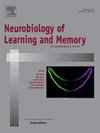Transplantation of medial ganglionic eminence cells rescues early-life stress-induced social and cognitive impairments in postnatal mice
IF 1.8
4区 心理学
Q3 BEHAVIORAL SCIENCES
引用次数: 0
Abstract
During the critical window of early development, exposure to stress has been demonstrated to impair brain function, thereby elevating the likelihood of subsequent social and cognitive impairments. In our study, we have developed a reliable mouse model of early life stress that emulates prevalent stressors in the human population, utilizing early maternal-infant separation coupled with a four-week chronic unpredictable mild stress (CUMS). Subsequent to this intervention, we transplanted GABAergic progenitor cells into the hippocampus with the aim of mitigating the social and cognitive deficits observed in postnatal mice. Our findings reveal that mice subjected to early stress display significant social and cognitive impairments, characterized by deficits in communication, cognitive developmental delays, repetitive behaviors, and anxiety-related affective disorders. The transplantation of GABAergic progenitor cells into the hippocampus of these stressed mice has been shown to enhance neurogenesis, increasing the population of GABAergic neurons and augmenting the expression of key synaptic proteins, including Reelin, Fyn, PSD95, and SYN.Our results highlight the potential of medial ganglion cell transplantation into the hippocampus to ameliorate the social and cognitive deficits triggered by early life stress. This approach holds significant promise for the therapeutic intervention of psychobehavioral disturbances stemming from early stress exposure.
内神经节隆起细胞移植可挽救出生后小鼠早期应激诱导的社交和认知障碍
在早期发育的关键时期,暴露在压力下已被证明会损害大脑功能,从而增加随后出现社交和认知障碍的可能性。在我们的研究中,我们开发了一种可靠的小鼠早期生活压力模型,该模型模拟了人类中普遍存在的压力源,利用早期母婴分离以及为期四周的慢性不可预测的轻度压力(CUMS)。在此干预之后,我们将gaba能祖细胞移植到海马中,目的是减轻出生后小鼠观察到的社交和认知缺陷。我们的研究结果表明,受到早期应激的小鼠表现出显著的社交和认知障碍,其特征是沟通缺陷、认知发育迟缓、重复行为和焦虑相关的情感障碍。将gabaergy祖细胞移植到应激小鼠的海马中,可以促进神经发生,增加gabaergy神经元的数量,增加关键突触蛋白的表达,包括Reelin, Fyn, PSD95和syn。我们的研究结果强调了内侧神经节细胞移植到海马中的潜力,可以改善早期生活压力引发的社会和认知缺陷。这种方法对早期压力暴露引起的心理行为障碍的治疗干预具有重要的前景。
本文章由计算机程序翻译,如有差异,请以英文原文为准。
求助全文
约1分钟内获得全文
求助全文
来源期刊
CiteScore
5.10
自引率
7.40%
发文量
77
审稿时长
12.6 weeks
期刊介绍:
Neurobiology of Learning and Memory publishes articles examining the neurobiological mechanisms underlying learning and memory at all levels of analysis ranging from molecular biology to synaptic and neural plasticity and behavior. We are especially interested in manuscripts that examine the neural circuits and molecular mechanisms underlying learning, memory and plasticity in both experimental animals and human subjects.

 求助内容:
求助内容: 应助结果提醒方式:
应助结果提醒方式:


